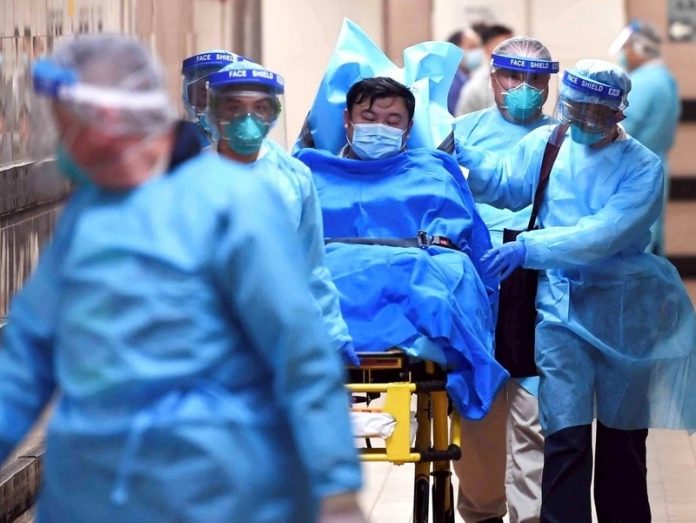By Won-Yong Oh
The coronavirus has spread to every continent. The numbers of confirmed cases and death continue upward in many countries. Doctors and nurses around the world are trying to save patients, but it seems the number of patients who need treatment is greater than the medical care available in some countries like Italy and Spain, and previously in cities such as Wuhan, China and Daegu, South Korea.
This raises important ethical questions for the healthcare industry: If doctors and nurses are unable to care for every patient, who should get treated first? They are forced to choose who to let die or who to be treated. How should limited health resources be allocated to achieve distributive justice?
Different Answers by Different Ethics Theories
This is not a simple question, and different business ethics theories may provide different answers. Also, in reality, different countries (e.g., Italy vs. South Korea) experienced overwhelming coronavirus care demand answered this question differently.
Prioritize patients with a high chance of successful treatment. According to teleological ethics, such as utilitarianism, the rightness of an act is determined by its end. The principle of utilitarianism is “maximum benefits for the greatest number”. This ethical view seems to have been adopted in Italy, where the number of confirmed cases and deaths are both rising dramatically; as of March, 25, it had almost 70,000 cases and a death toll that had surpassed 6,800.[1]
The Italian College of Anesthesia, Analgesia, Resuscitation and Intensive Care has published guidelines for the criteria that medical staff should follow in deciding who to treat.[2] It states that “health resources must aim at guaranteeing intensive treatments to patients with greater chances of therapeutic success: it is therefore a matter of privileging the ‘greatest life expectancy’”. For example, artificial ventilators are used for patients with breathing difficulties, but due to the limited availability of these machines, Italian doctors prioritize patients with a higher chance of successful treatment.[3] In other words, relatively young patients without preexisting health problems are prioritized, while patients over 80 are not.
Prioritize patients with the most urgent need. In the deontological ethics, a decision is ethical because of the characteristics of the action itself, not because of the outcome of the decision. The ethical dilemma of utilitarianism is how doctors are able to judge whether one patient’s life is more valuable than another’s.
Coronavirus patients who are 80 years old or older have a death rate of about 15%.[4] In other words, 85% of elderly patients are likely to survive if given proper care. Therefore, is it morally justifiable to give up on those patients? Furthermore, we never be sure whether the actual outcome of utilitarianism approach (i.e., treating patients who with a higher chance of successful treatment first) would save more people. Patients with lower risk may be able to survive without medical treatment whereas high risk patients may survive if given proper care.
If frontline medical workers adopt the deontological ethics, they should conclude that they should treat patients who need medical care the most, regardless of their age or preexisting health conditions. It seemed that South Korea adopted this approach. Hospitals in Daegu, South Korea experienced a lack of hospital beds and patients were waiting for hospitalization at home. However, in contrast to Italy, patients with underlying health issues, old age, high-risk groups, and severe symptom from coronavirus got hospitalized first.
Other countries are also likely to face Ethical Dilemmas
In a time of a pandemic, the health industry is likely to face an imbalance between the clinical needs of the population and the availability of medical resources. The coronavirus is spreading very fast; thus, other countries are very likely to face these ethical challenges.
For example, according to OECD Health Statistics, the United States has only 2.8 hospital beds per 1,000 people. Other countries with major coronavirus outbreaks have more resources: China has 4.3, Italy has 3.2, Spain has 3.0, and South Korea has 12.3 per 1,000 people.[5] This suggests that the U.S. may not have enough hospital beds to treat all infected patients. According to Aaron Carroll, a professor at the Indiana University School of Medicine, about 200,000 patients could need intensive care units in a moderate outbreak. However, the U.S. has only about 45,000 intensive care unit beds.[6] How about other countries? Canada and Denmark have 2.5, Finland has 3.3, Iceland has 2.9, Norway has 3.6, and U.K. has 2.5 hospital beds per 1,000 people. No country has numbers above 10 except Japan and South Korea.
Who should get priority? Patients who have a high chance of treatment success or those who need urgent medical attention? Answering this question is critically important, even to patients who need treatment for health problems other than the coronavirus, because they have to use the same limited medical resources. Frontline medical workers should not be the only ones who take responsibility in making these morally challenging decisions. How should policy makers and ethics academics guide doctors and nurses amid challenges of coronavirus care?
About the Author
 Won-Yong Oh is Lee Professor of Strategy at the Lee Business School, University of Nevada, Las Vegas (UNLV) in the USA. Before moving to UNLV, he was a faculty member at Haskayne School of Business, University of Calgary in Canada. He has published more than 50 articles, book chapters and case studies. His research areas include corporate social responsibility, business ethics, and corporate governance.
Won-Yong Oh is Lee Professor of Strategy at the Lee Business School, University of Nevada, Las Vegas (UNLV) in the USA. Before moving to UNLV, he was a faculty member at Haskayne School of Business, University of Calgary in Canada. He has published more than 50 articles, book chapters and case studies. His research areas include corporate social responsibility, business ethics, and corporate governance.
Endnotes:
[1] https://www.who.int/docs/default-source/coronaviruse/situation-reports/20200325-sitrep-65-covid-19.pdf?sfvrsn=ce13061b_2
[2] http://www.siaarti.it/SiteAssets/News/COVID19%20-%20documenti%20SIAARTI/SIAARTI%20-%20Covid19%20-%20Raccomandazioni%20di%20etica%20clinica.pdf
[3] https://www.euronews.com/2020/03/12/coronavirus-italy-doctors-forced-to-prioritise-icu-care-for-patients-with-best-chance-of-s
[4] https://www.businessinsider.com/coronavirus-death-age-older-people-higher-risk-2020-2
[5] https://data.oecd.org/healtheqt/hospital-beds.htm
[6] https://www.nytimes.com/2020/03/12/upshot/coronavirus-biggest-worry-hospital-capacity.html


































